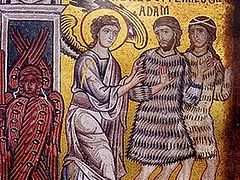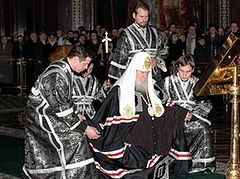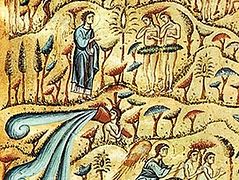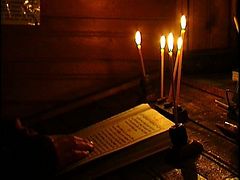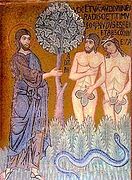Matt 6:14-21/Rom 13:11-14
 Forgiveness Sunday
Forgiveness Sunday
The fast was proclaimed, practised and spoken about by our Lord Jesus Christ, but what kind of fasting was He speaking of? He spoke concerning a genuine fast, a fast with a deep spiritual purpose — not the kind of fast with which most of us are probably familiar. He spoke of a fast that was not only abstinence from food, but (and more important) abstinence from sin/ the act of pleasing our self will and not the will of God.
Fasting, in itself, is not a religious virtue (although it is certainly healthy); rather, it a spiritual exercise/tool whereby a human can rouse their virtue towards the wakefulness and constant zeal of their soul for Gods providential care. Thus, in today's Gospel Lesson, Jesus insists that fasting be accompanied by two virtues: that of forgiveness, and that of almsgiving. Historically, the Pharisees fasted very strictly and ostentatiously. Their eyes were gloomy, their attitude sorrowful. And, most terrible of all, they put ashes over their heads to show people that their fast was a strong and a difficult one. In the presence of other people they beat their breasts, loudly lamenting their sins. On the other hand, although they boasted of their strict fasting, they continued to oppress the poor — especially widows and orphans.
‘And when you fast, do not look dismal, like the hypocrites, for they disfigure their faces that their fasting may be seen by men’ (Matt 6:16). These hypocrites whom Christ was addressing attempted to prove their worthiness not to God, who knows every inner thought of a person; rather, they concentrated on impressing their fellow humans with their arrogant and counterfeit righteousness for vain glory. Fasting — abstaining from all the forbidden foods — has little value if we persist in gossip, slander, and hating our sister or brother, refusing to be reconciled with our fellow human. The purpose of fasting is, under these conditions, perverted and destroyed. Unfortunately, many who consider themselves exemplary Orthodox Christians practice just this type of pseudo fasting. St. John Chrysostom wrote these eloquent words on the subject of fasting:
The fact is of real value only when it stems from a pure heart; when one is ready to deny wealth, and stand above money; when one is ready to give alms to the poor; when one has love and affection, not only for one's own children, but also for the orphans and the poor. One manifests real fasting when he is ready to deprive himself of food, in order that the hungry and destitute might be fed. One really fasts when he maintains his equilibrium under all stress, never allowing himself to lose his temper and explode like a volcano, destroying everyone around him. A genuine fast involves the willingness to discard all vain ambition, which often results in destruction — not only for those who practice it, but for all who are close to them. One who is actually fasting never manifests covetousness/jealousy.
The saint hastens to add that he is not condemning the practice of fasting: ‘God forbid; rather, I extol it!’, he said. Yet he insists that, unaccompanied by virtue, that is, if fasting is not for the purpose of building greater zeal for God, then fasting is worthless.
In the enumeration of virtues, fasting comes last; the first three are love, forbearance/patience and charity/mercy. To really fast, we must abstain not only from food, but from sin, otherwise we dishonour the holy period of Great Lent. Sin means to please our self will/ not trying to please God or as St Paul said, to gratify the desires of the flesh which he means our passionate attachments to the things of this world. Christ said ‘Do not treasure up for yourselves treasures upon the earth’ (Matt 6:19). It is human nature to worry about whether or not one’s treasures are safe; but if those treasures are one’s heavenly rewards, then one’s heart will dwell in heaven, high above all earthly anxiety.
What is the use of not eating meat, if we cannot abstain from negative thoughts like criticizing our sister and brother behind their back? What is the use of not eating cheese, if we continue to conduct ourselves in gratification of our senses, and in quarrelling and jealousy?
Tomorrow is Pure Monday, the first day of the Lent, let us begin our spiritual preparations for the great and holy banquet — the passion and final resurrection of Christ. During this period we have the opportunity to apply more zeal in our prayer life; to train ourselves to be more attentive to the will of God, knowing that the beginning and the end of our spiritual journey is resurrection in Christ, this is our treasure in heaven, which we anticipate even from now. If we do this sincerely during the Fast, we will gain new strength in every moment of our life by the visitation of the grace of God. On a final note, let us contemplate the coaching words stated by one of the idiomela of the Triodion which we chanted this morning after the ‘praises’/’Lauds’:
The stadium of virtue is now open;
those who wish to compete, enter
therein, girded for the good contest of
Lent, for those who compete according
to the rules shall receive their laurels
rightfully. Taking up the full armor of
the Cross, let us do battle against the
Enemy. As an impregnable wall, we
have the Faith, prayer as our breast‐
plate, and acts of mercy as our helmet.
Instead of sword, there is fasting,
which cuts every evil from the heart.
He who does this shall attain a true
crown from Christ, the King of all, on
Judgment Day. Amen.

